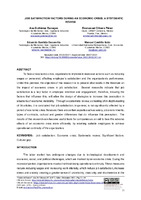| dc.creator | Gutiérrez Banegas, Ana | |
| dc.creator | Olivera Pérez, Emmanuel | |
| dc.creator | Bastida Escamilla, Eduardo | |
| dc.creator | Castillo Soto, Manuel | |
| dc.date.accessioned | 2022-09-08T22:38:27Z | |
| dc.date.available | 2022-09-08T22:38:27Z | |
| dc.date.issued | 2021-06-07 | |
| dc.identifier.citation | Gutiérrez Banegas, A., Olivera Pérez, E., Bastida Escamilla, E., y Castillo Soto, M. (2021). Factors of job satisfaction during an economic crisis. A systematic review. Revista Científica, Visión de Futuro. Posadas (Misiones): UNaM. FCE. APP; 26(2), 22-35. | es_AR |
| dc.identifier.issn | 1668-8708 | |
| dc.identifier.other | VF-100 | |
| dc.identifier.uri | https://hdl.handle.net/20.500.12219/3589 | |
| dc.description | Fil: Gutiérrez Banegas, Ana. Tecnológico de Monterrey. Departamento Ingeniería Industrial; México. | es_AR |
| dc.description | Fil: Olivera Pérez, Emmanuel. University Popular Autónoma del Estado de Puebla; México. | en |
| dc.description | Fil: Bastida Escamilla, Eduardo. Tecnológico de Monterrey. Departamento Ingeniería Industrial; México. | es_AR |
| dc.description | Fil: Castillo Soto, Manuel. Universidad Autónoma Metropolitana. Departamento Economía; México. | es_AR |
| dc.description.abstract | To face an economic crisis, organizations implement recessive actions such as reducing salaries or personnel, affecting employee satisfaction and the organization's performance. Under this premise, the objective of this research is to present what exists in the literature on the repercussions of economic crises on job satisfaction. Several investigations indicate that job satisfaction is a key factor in employee retention and engagement; therefore, knowing the factors that influence this will allow the design of strategies to increase this perception in situations of economic instability. Through a systematic review, consisting of in-depth Reading of 36 articles, it is concluded that job satisfaction, in general, is not significantly affected by a period of economic crisis; however, there are certain aspects such as salary, work environments, types of contracts, cultural and gender differences that do influence this perception. The results of this research can become useful tools for companies as an aid to face the adverse effects of an economic crisis more efficiently by retaining suitable employees to achieve operational continuity of the organization. | en |
| dc.format | application/pdf | |
| dc.format.extent | 414.7 KB | |
| dc.language.iso | eng | es_AR |
| dc.publisher | Universidad Nacional de Misiones. Facultad de Ciencias Económicas. Programa de Posgrado en Administración | es_AR |
| dc.relation | info:eu-repo/semantics/altIdentifier/doi/https://doi.org/10.36995/j.visiondefuturo.2022.26.02.001.en | |
| dc.relation | info:eu-repo/semantics/altIdentifier/urn/https://revistacientifica.fce.unam.edu.ar/index.php/visiondefuturo/article/view/513/743 | |
| dc.rights | info:eu-repo/semantics/openAccess | |
| dc.subject | Job satisfaction | en |
| dc.subject | Economic crisis | en |
| dc.subject | Systematic review | en |
| dc.subject | Significant factors | en |
| dc.subject | Cultural gap | en |
| dc.title | Job satisfaction factors during an economic crisis. A systematic review | en |
| dc.type | info:eu-repo/semantics/article | |
| dc.type | info:ar-repo/semantics/artículo | |
| dc.type | info:eu-repo/semantics/publishedVersion | |



